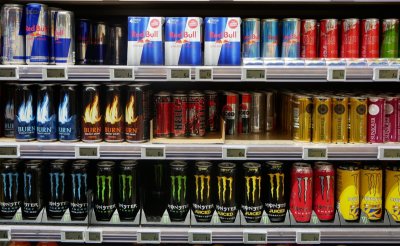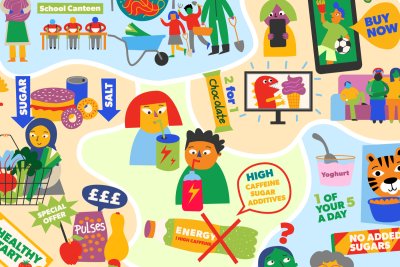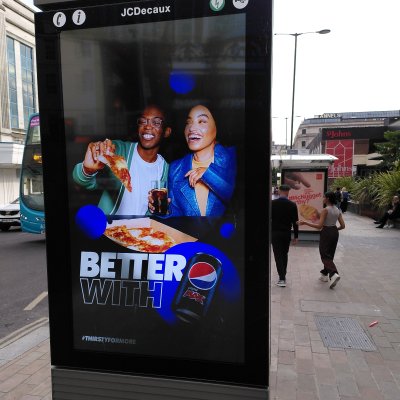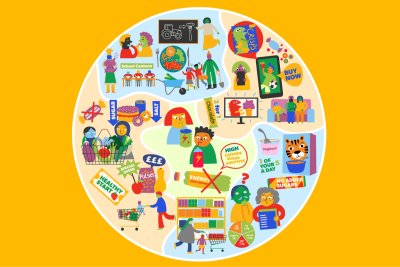News • Children's Food Campaign
Labour considering ban on sales of energy drinks to under-16s in manifesto
Children's food and health organisations welcome news reports that the Labour Party may now be considering a ban on sales of high caffeine energy drinks to under-16s, as part of their forthcoming election manifesto.

According to news reports, the Labour Party is actively considering a future ban on sales of high caffeine energy drinks to under-16s as part of its election manifesto, as part of a wider agenda to protect children's wellbeing and reduce diet-related ill health.
In January 2024, the Children's Food Campaign and Food Active co-ordinated a joint letter from over 40 health experts and organisations asking both the government and shadow health ministers to act on worrying new evidence of physical and mental health effects on children from consuming high levels of caffeine in energy drinks.
Energy drinks typically contain 140-200mg caffeine per bottle or can. Under European laws they are required to carry warning labels saying they are "not suitable for consumption by children or pregnant women." The Government consultation proposed restricting sales to under-16s for any drinks with more than 150mg per litre.
Children's Food Campaign Manager Barbara Crowther says:
"Energy drinks companies shouldn't be allowed to increase profits at the expense of child health. All evidence points to these heavily caffeinated drinks being harmful to children's health.
We're excited to hear that Labour has listened to public and health experts' concerns about energy drinks. The Government promised in 2019 that it would ban sales to under-16s, but didn't actually do it. The drinks already say 'not suitable for children', so it's a fairly logical step to stop actually selling to children too. It had 93% public approval during the last extensive government consultation, so we'd like it to be in all the party manifestos.
There is also a lot of support for this measure from supermarkets who are already restricting sales to children voluntarily - they know that to reduce children's consumption of potentially harmful drinks, there needs to be a ban on selling to them everywhere. With evidence growing on both mental and physical harms of these drinks, it’s time for action.”
Read our January letter to the Labour Party
A new evidence review led by Professor Amelia Lake at Fuse, the centre for Translational Research in Public Health at Teesside University and Newcastle University has revealed even more wide ranging health impacts associated with consumption of energy drinks by children. These include:
- increased risk of suicidal thoughts and psychological distress
- symptoms associated with attention deficit hyperactivity disorder (ADHD)
- depressive and panic behaviours
- allergic diseases
- insulin resistance
- tooth decay
- increased risk of poor academic performance
- sleep problems
- less healthy dietary patterns.
Welcoming the proposals to ban the sale of energy drinks to under 16s, Professor Amelia Lake from Fuse said:
“Our research shows that there is an international body of evidence that associates energy drinks with harmful physical and mental health issues, as well as impacting on their educational attainment.
“We need to see clear messaging that these drinks are not suitable for children and young people. An outright ban of their sales to under 16s makes it clear.”
A number of countries have started to regulate sales and marketing of energy drinks, including bans on sales to under-18s in Poland, Lithuania and Latvia. The UK government ran a consultation on ending the sale of energy drinks to children in England and confirmed an intention to bring in legislation in their 2019 green paper ‘Advancing our health: prevention in the 2020s’. While 93% of respondents to the consultation supported restricting sales to under 16s, there has been no further action. In 2022, the devolved government in Wales launched its own consultation to ban the sales of energy drinks to under 16s.
Whilst there has been some sugar reduction in energy drinks in recent years, levels of caffeine remain worryingly high in some products. In May 2023, a primary school in Newport issued a warning notice to all parents following a pupil having a 'cardiac episode' and having to have their stomach pumped after drinking a can of Prime Energy. Prime Energy, fronted by social media influencers Logan Paul and KSI who provide major huge youth appeal, contains 140mg caffeine per can. Meanwhile they also produce a non-caffeinated Prime Hydrate range which has become very popular with children and is widely marketed and advertised. This has almost identical branding, increasing risk of confusion or young people also then moving on to the heavily caffeinated product.
Published Saturday 10 February 2024
Children's Food Campaign: Better food and food teaching for children in schools, and protection of children from junk food marketing are the aims of Sustain's high-profile Children's Food Campaign. We also want clear food labelling that can be understood by everyone, including children.





